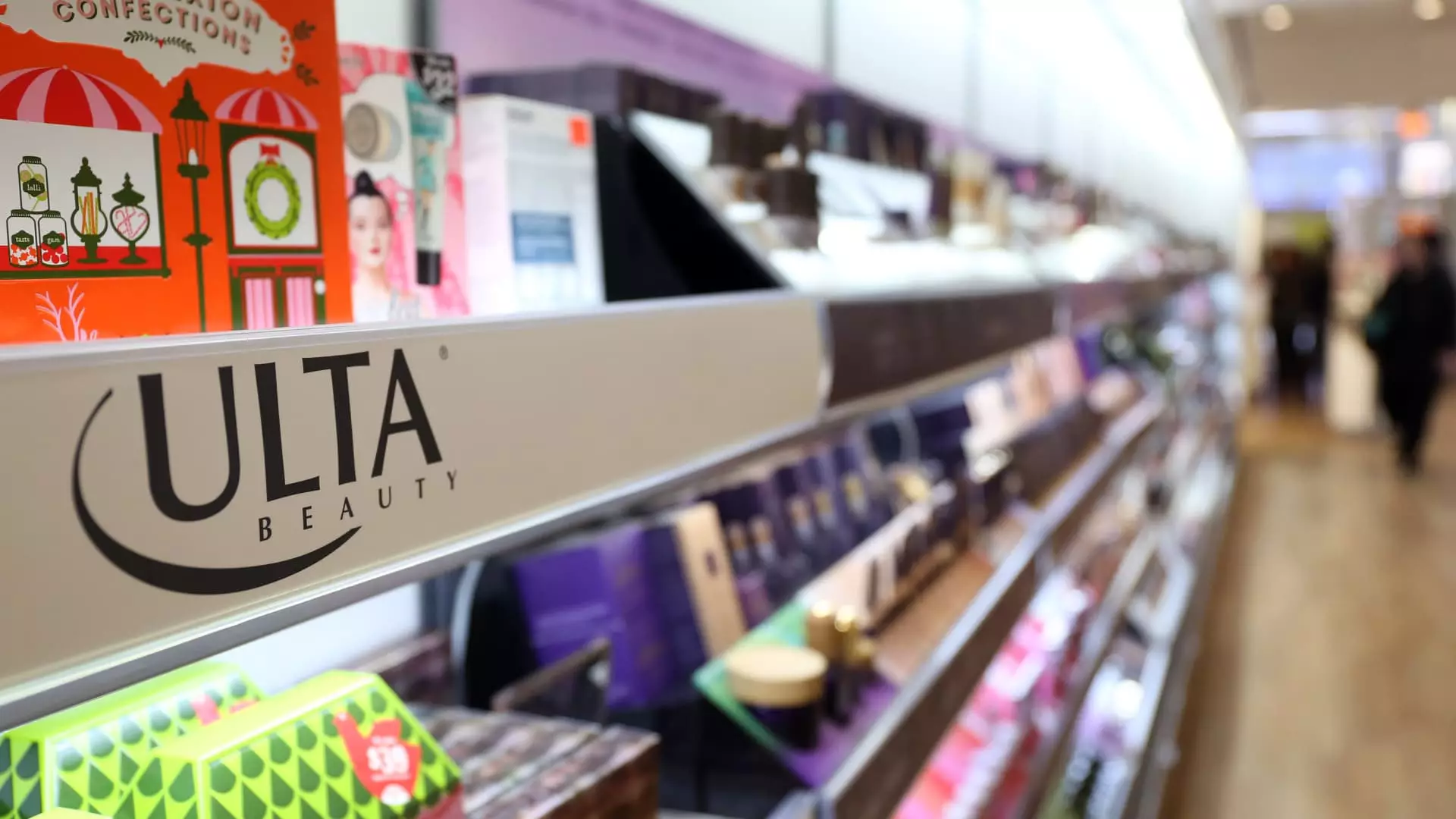Ulta Beauty recently announced its financial results for the fiscal third quarter, surpassing Wall Street’s expectations and alleviating some concerns regarding increased competitive pressures and a perceived decline in consumer demand for cosmetic and skincare products. During this quarter, which ended on November 2, the company reported earnings per share of $5.14, exceeding analyst predictions of $4.54, alongside revenue of $2.53 billion compared to the anticipated $2.50 billion. This positive performance sent Ulta shares soaring more than 10% after hours, indicating market confidence in the retailer’s strategies.
In light of the better-than-expected results, Ulta revised its full-year outlook. It now anticipates net sales will be between $11.1 billion and $11.2 billion, a slight increase from its prior estimate of $11 billion to $11.2 billion. Furthermore, the company expects annual earnings per share to fall within the range of $23.20 to $23.75, up from the previous forecast of $22.60 to $23.50. Despite these optimistic projections, Ulta anticipates a decline in comparable sales percentages during the crucial holiday quarter—a period that typically contributes significantly to retail revenues.
Comparable sales—a critical measure in retail that evaluates sales at locations open for more than 14 months, plus online sales—are projected to either decline by low single digits or remain flat. Although the retailer’s performance reflects a marginal increase of 0.6% in comparable sales year-over-year, this slight growth hints at a tentative marketplace where even minor fluctuations can have profound implications. For instance, customer traffic and transaction values were reported to have grown minimally, with average spending rising just 0.1%. These figures underscore a consumer base that is growing more selective, revealing the inherent challenges that retailers like Ulta face in today’s economic climate.
The broader retail environment has seen beauty products retain a robust position, remaining in demand even as rising inflation has compelled consumers to reconsider discretionary spending. This resilience has led competitors, such as Target, Walmart, and Kohl’s, to enhance their beauty product offerings. However, Ulta’s CEO, Dave Kimbell, previously expressed apprehensions over a cooling beauty market, raising red flags about impending challenges within the sector. Following a disappointing earnings report in August, the company also saw its stock price decline significantly—down nearly 19% this year, which starkly contrasts with the S&P 500’s 28% increase.
Analysts and investors alike remain keenly aware of these market conditions, recognizing the forces shaping Ulta’s operational strategies. The company reported a net income of $242.2 million in the third quarter, down slightly from $249.5 million year-on-year. These figures indicate that, despite positive short-term gains, the retailer is also grappling with internal pressures.
Strategically, Ulta’s response to market conditions includes the introduction of new products and enhanced customer experiences. Kimbell noted that exclusive product lines, like the collaboration tied to Universal’s “Wicked,” and digital tools such as virtual try-on enhancements, have bolstered the company’s performance during the quarter. In-store events designed to directly engage customers also contributed positively; these events included styling workshops led by Ulta’s beauty professionals that fostered closer customer relationships.
However, as the critical holiday season approaches, Kimbell’s cautious optimism reveals the potential for unforeseen challenges driven by broader economic uncertainties. CFO Paula Oyibo echoed these sentiments, noting a conservative perspective on consumer behavior and the overall business environment in her commentary. She also highlighted the unique challenges posed by a compressed holiday season this year, which may detract from consumer spending as shoppers navigate fewer days to shop between Thanksgiving and Christmas.
As the holiday shopping season commences, the uncertainty surrounding economic conditions requires Ulta Beauty to remain agile and responsive to consumer needs. While the retailer’s performance in the third quarter supports a positive outlook, it must navigate a complex landscape characterized by both expectations and realities. By continuing to innovate and respond proactively to consumer trends, particularly around value and experience, Ulta can fortify its market position, ensuring its sustainability and growth even amid this evolving consumer landscape.
Ulta Beauty’s recent fiscal results reveal a company that effectively harnesses its strengths while remaining acutely aware of external challenges. The holiday season will test its strategies further, as both internal dynamics and external economic pressures unfold. The beauty retailer’s ability to adapt will be key to maintaining its momentum and ultimately achieving its financial goals in the coming months.


Leave a Reply